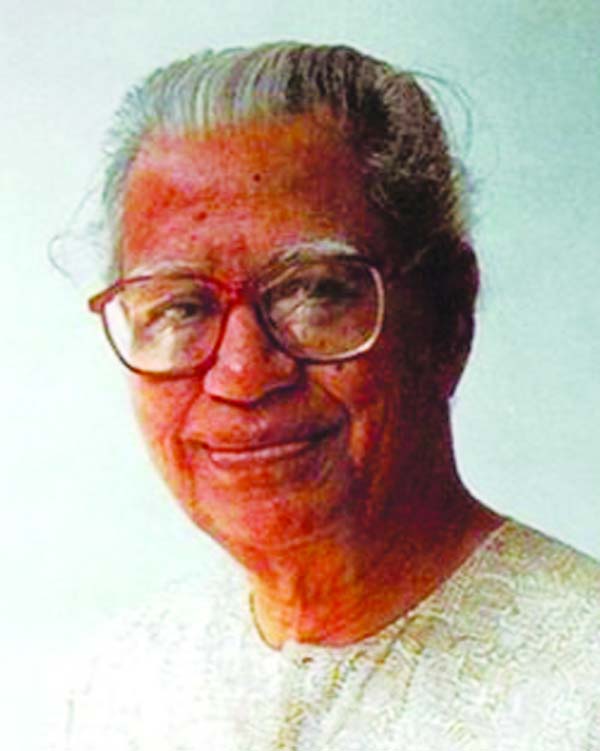
Bimal Guha :
Abul Hussain, (1896-1938) writer, intellectual and social activist, was born on 6 January 1896 at the home of his maternal uncle in Panisara in Jessore. His paternal residence was at Kauria in Jessore. His father Haji Mohammad Musa was an Islamic scholar.
Abul Hussain passed the Matriculation examination from Jessore Zila School in 1914. He passed IA and BA from Presidency College, Kolkata, and MA in Economics (1920), BL (1922) and ML (1931) from the University of Calcutta. In 1920 he started teaching at Hare School. In 1921, he joined the Economics Department of the newly opened University of Dhaka as lecturer. He also served as house tutor of Muslim Hall. In 1932, he resigned from the University and joined the Calcutta High Court as an Advocate. He was responsible for drawing up the main draft of the Waqf Law, which was passed by the Bengal Legislative Assembly.
Abul Hussain wrote several books to foster the growth of modern education among the Muslim society of Bengal. In the essays of Banglar Balshi, he mainly showed how to achieve liberation for the peasant society. Inspired by the French Revolution, he wrote about the plight of the working classes in several essays, such as: ‘Krisoker Artonad’ (The Peasant’s Lament), ‘Krisoker Durdosha’ (The Peasant’s Plight) and ‘Krisi Biplober Suchona’ (The Beginning of the Agricultural Revolution).
Abul Hussain was the moving spirit behind the Buddhir Mukti Andolon (movement for freedom of thought), which originated from the university of Dhaka and whose motto was ‘Where knowledge is limited and intellect thwarted, freedom is absurd’. He gave a constitutional shape to this movement in 1926 by forming the Muslim Sahitya Samaj (Muslim Literary Society) with some associates in Dhaka. He also edited its mouthpiece, Shikha. Among his associates were Kazi Abdul Wadud, Quazi Motahar Husain, Muhammad Shahidullah and Abul Fazal. As a leading member of this group, which believed in freedom of thought, Abul Hussain was ostracized by the conservative Muslim society of Dhaka city. He ultimately had to resign from his University position and move to Kolkata.
Apart from Banglar Balsi (1925), Abul Hussain also wrote several other books which reflect his liberal outlook: Bangali Musolmander Shiksa Somosya (1928), Muslim Culture (1928), Banglar Nari Somosya, Shotkora Poytallisher Jer, Sud-Riba O Rewaj, Nisedher Birombana, Helots of Bengal, Religion of Helots of Bengal, Development of Muslim Law in British India, etc. Abul Hussain’s writings have been published by the Bangla Academy in Abul Hussainer Rachanabali.
Abul Hussain died of cancer in Kolkata on 15 October 1938. n
Abul Hussain, (1896-1938) writer, intellectual and social activist, was born on 6 January 1896 at the home of his maternal uncle in Panisara in Jessore. His paternal residence was at Kauria in Jessore. His father Haji Mohammad Musa was an Islamic scholar.
Abul Hussain passed the Matriculation examination from Jessore Zila School in 1914. He passed IA and BA from Presidency College, Kolkata, and MA in Economics (1920), BL (1922) and ML (1931) from the University of Calcutta. In 1920 he started teaching at Hare School. In 1921, he joined the Economics Department of the newly opened University of Dhaka as lecturer. He also served as house tutor of Muslim Hall. In 1932, he resigned from the University and joined the Calcutta High Court as an Advocate. He was responsible for drawing up the main draft of the Waqf Law, which was passed by the Bengal Legislative Assembly.
Abul Hussain wrote several books to foster the growth of modern education among the Muslim society of Bengal. In the essays of Banglar Balshi, he mainly showed how to achieve liberation for the peasant society. Inspired by the French Revolution, he wrote about the plight of the working classes in several essays, such as: ‘Krisoker Artonad’ (The Peasant’s Lament), ‘Krisoker Durdosha’ (The Peasant’s Plight) and ‘Krisi Biplober Suchona’ (The Beginning of the Agricultural Revolution).
Abul Hussain was the moving spirit behind the Buddhir Mukti Andolon (movement for freedom of thought), which originated from the university of Dhaka and whose motto was ‘Where knowledge is limited and intellect thwarted, freedom is absurd’. He gave a constitutional shape to this movement in 1926 by forming the Muslim Sahitya Samaj (Muslim Literary Society) with some associates in Dhaka. He also edited its mouthpiece, Shikha. Among his associates were Kazi Abdul Wadud, Quazi Motahar Husain, Muhammad Shahidullah and Abul Fazal. As a leading member of this group, which believed in freedom of thought, Abul Hussain was ostracized by the conservative Muslim society of Dhaka city. He ultimately had to resign from his University position and move to Kolkata.
Apart from Banglar Balsi (1925), Abul Hussain also wrote several other books which reflect his liberal outlook: Bangali Musolmander Shiksa Somosya (1928), Muslim Culture (1928), Banglar Nari Somosya, Shotkora Poytallisher Jer, Sud-Riba O Rewaj, Nisedher Birombana, Helots of Bengal, Religion of Helots of Bengal, Development of Muslim Law in British India, etc. Abul Hussain’s writings have been published by the Bangla Academy in Abul Hussainer Rachanabali.
Abul Hussain died of cancer in Kolkata on 15 October 1938. n

